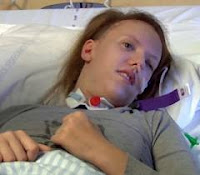The following article was written by Dr. Sinéad Donnelly, a consultant in palliative care from Wellington New Zealand. The article was published in the Journal of the New Zealand Medical Association, November 23, 2012, Vol 125 No 1366.
 |
| Sinéad Donnelly |
I come from a long line of doctors; since 1905, three generations and seven doctors. From my general practitioner grandfather I have learned the art of attending in medicine. From my physician father I have learned the art of observing. I am a palliative medicine physician for 21 years. I practise the art and science of palliative medicine.
As a palliative medicine physician I care for 400 each year for 21 years who have advanced disease and who have died. I have worked and trained in Ireland, Scotland and United States and have been in New Zealand for the past 4 years.
My whole being cries out “do not do this” to the concept of legalising euthanasia in this country.
The World Health Organization defines palliative care as an approach that improves the quality of life of patients and their families facing the problems associated with life-threatening illness through the prevention and relief of suffering by means of early identification and impeccable assessment and treatment of physical symptoms. Of particular note, it says that palliative care affirms life, regards dying as a normal process and intends neither to hasten nor postpone death.
I am opposed to euthanasia as a doctor and as a palliative medicine physician. ANZSPM Aotearoa (New Zealand branch) of which I am chair represents 86 doctors in New Zealand who practice palliative medicine. We agree with the New Zealand Medical Association (representing over 5000 doctors) in stating that euthanasia—i.e. a doctor deliberately ending the life of a patient—is unethical and illegal.

The annual meeting of ANZSPM Aotearoa in Queenstown this year included a discussion on Maryan Street’s (Labour Party Spokesperson on Health) proposed Bill. There was unanimous opposition to the legalisation of euthanasia.
Every day I spend hours with people who are facing death, whose greatest need in my experience is to be truly heard, truly listened to, not abandoned emotionally or physically. People yearn so much to receive care unconditionally. They are sensitive acutely to any sign that others feel they are a burden. When they sense this by a look, a tone, a pause, a lack of a pause, the pace of a conversation, they close down, retreat and their overall suffering increases.
For me the essence of medicine and the therapeutic relationship is listening with particular attention. I have laboured to achieve that over many years as a doctor, honing my skills in several countries, adding to my experience to serve others. Listening is a form of touch; it is an analogous to auscultation of the heart knowing specifically what abnormal heart sounds or murmurs to listen for. Listening in medicine is not to be perceived as an act of benevolence born out of compassion but instead approached as essential clinical skill that is as much science as art.
International literature identifies that the main reason for people supporting euthanasia is not due to intolerable pain but is instead people feeling a burden and loneliness. Euthanasia is not the answer to society’s disease of loneliness. The strongest predictive factor from the international literature for a wish to hasten death in those with terminal illnesses is hopelessness.
 |
| Euthanasia |
Euthanasia is not an answer to society’s disease of hopelessness. The word euthanasia disguises a practice which one might abhor if it were given another name and the other name would be “to kill” someone. Let us take the protective cloak of medicine away in what is this in fact deliberately ending the life of another person. Being treated with dignity is not only about self control, autonomy, independence, maintaining physical function. It is also present when one is honoured and treated with esteem. Caring lovingly for someone is itself an act of dignity and can provide dignity to another.
My experience has taught me how complex is each person, how individual is their life and death, how again and again people respond to holistic care and attention. The law is there to protect the vulnerable. Maryan Street’s Bill will in fact expose the vulnerable. This is a matter of public safety. Professor of Palliative Medicine Ilora Finlay has stated “the Bill you have before you in New Zealand is the most radical and extreme of any piece of legislation anywhere in the world because basically it is euthanasia on demand. It safe guards our people to the point of being absent.”
This Bill will include anyone who suffers from an irreversible, physical or mental condition that in the person’s view renders his or her life unbearable. This will include a person with diabetes, arthritis, anorexia nervosa, depression. Any person with a chronic illness will be included within the legislation. This runs counters to our efforts to reduce the incidence of suicide not to promote suicide.
Clause 27 of Maryan Street’s Bill requires a medical practitioner who declined to participate to provide alternative source of medical assistance. There is no right to conscientious objection for the doctor. As a result by not participating, a person who commits such an offence will be liable on summary conviction to a term of imprisonment not exceeding 3 months or a fine not exceeding $10,000 or both. So you have a picture of those doctors who are opposing euthanasia, of which there are many, rotating through the prison system.

Based on the statistics for the Netherlands where euthanasia is legal, there would be at least 700 such people euthanised in New Zealand each year. This is clearly not two or three per year. In 2011 in the Netherlands there was increase of 18% to 3695 people who were euthanized; 23% of euthanasia deaths are not reported so 4544 is probably the correct estimate. In the Netherlands in 2012 they planned to have six more mobile euthanasia teams anticipating an additional 1000 deaths this way providing a service for those chronic depression, dementia and loneliness, and for those whose request is declined by their physician.
I visited Nijmegen in the Netherlands for a 1-week course on bioethics including euthanasia several years ago. They showed a documentary with a general practitioner practising euthanasia. My immediate impression was that the doctor was depressed.
S McLeod has written in the Australian New Zealand Journal of Psychiatry that the fatigued, hopeless and despairing doctor confronted by a patient requesting assisted suicide may more subtly encourage the act. Kelly et al, wrote that clinicians burdened with the care of the very sick were frustrated by therapeutic impotency struggling to communicate effectively and seduced by the apparent rationality of the request, may become like their patients, supportive and implicit in quickening death.
Many physicians who have practised euthanasia in the Netherlands said that they would be most reluctant to do it again. In the US state of Oregon, doctors attending persons requesting PAS report being intimidated by patients to assist and have been powerless to influence the decision making process. Oregon doctors reported being personally damaged by the experience. It appears that the personal and professional experience of therapeutically killing is discouraging doctors from accepting these patients on to their books.
Kelly et al draws attention to the complexity of physician response to the care of the terminally ill, reflecting at times their sense of hopelessness and demoralisation. Physicians like all other human beings cannot entirely escape their own prejudices and bias about what constitutes quality of life and a good death and where and whether suffering has meaning.
The goal of medicine is never to give up caring. As a doctor you can harm by a look or by phrase because of the vulnerability of a person who is ill. Such people are extraordinarily vulnerable calling for extraordinary compassionate care. We need skills and knowledge to know how to provide that exquisite competent care.
I have heard Glenn Colquhoun (New Zealand GP and poet) say that medicine is a spiritual profession and that in the patient/doctor relationship the spirit of the patient is exposed. In medicine—a science of the purely subjective—we encounter the ache of being human.
Patelehio writes, “A man who had Alzheimer’s disease and was dying had struggled for so long. He had endured memory loss for many years. All the while his daughter had taken very good care of him. One day towards the end of his life she asked him “do you know who I am?” and he replied “No I don’t know who you are but I love you.”
The legalisation of euthanasia in New Zealand will hurt the profession of medicine irrevocably. The soul of medicine is on trial. Euthanasia will expose further the vulnerable in New Zealand society. Euthanasia will not solve the aching loneliness of our broken society.
Sinéad Donnelly
Consultant in Palliative Medicine, Capital & Coast District Health Board (CCDHB), Wellington
Adjunct Professor, School Biological Sciences, Victoria University, Wellington
Senior Clinical Lecturer, Otago School of Medicine, Wellington































